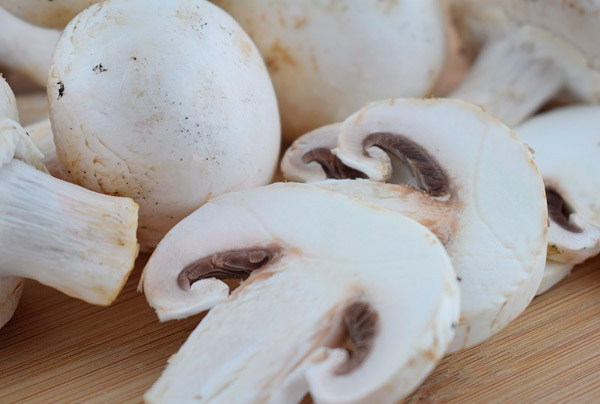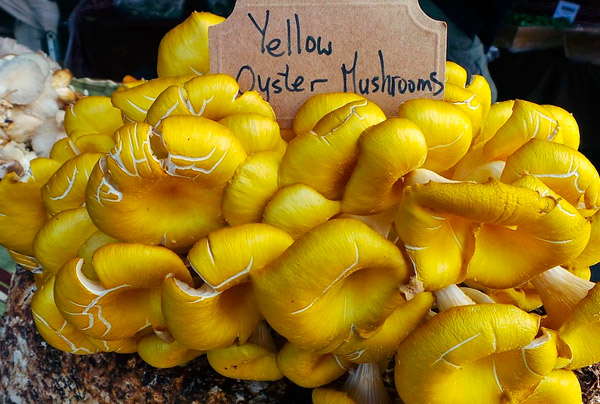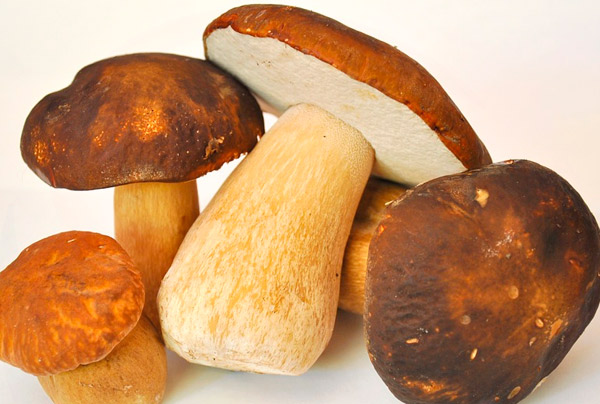Medical expert of the article
New publications
Benefits and harms of mushrooms
Last reviewed: 04.07.2025

All iLive content is medically reviewed or fact checked to ensure as much factual accuracy as possible.
We have strict sourcing guidelines and only link to reputable media sites, academic research institutions and, whenever possible, medically peer reviewed studies. Note that the numbers in parentheses ([1], [2], etc.) are clickable links to these studies.
If you feel that any of our content is inaccurate, out-of-date, or otherwise questionable, please select it and press Ctrl + Enter.

Many people know that this is a very difficult food for the stomach. It all depends on what mushrooms you eat and in what form.
Cooked or dried mushrooms are good because they are very rich in microelements.
Mushrooms offer excellent nutrition for your growing baby.
Mushrooms are the main sources of B vitamins, which are beneficial for mother and baby. Thiamine and niacin help in the development of the baby's brain, relieve fatigue and increase energy. Riboflavin helps maintain healthy skin, improves vision and develops strong bones, muscles and nerves. Pantothenic acid prevents digestive problems.
Mushrooms contain significant amounts of protein and fiber. Protein is essential for the development of absolutely all cells and their metabolism, as it helps participate in the synthesis of acids. For additional protein requirements, especially for vegetarians, you can rely on mushrooms. To remove fatigue and keep yourself under control, mushrooms are of great help. Mushrooms are one of the main sources of both insoluble chitin and soluble beta-glucans, each of which is a fiber that plays a role in human health. Insoluble fiber is essential for proper digestion, while soluble fiber can slow down the rise in blood sugar in your body after a meal, and also helps moderate blood pressure and cholesterol levels.
A young mother's body has an increased need for hemoglobin, as you share it with your baby through milk. Mushrooms are an excellent source of iron, which helps produce hemoglobin and red blood cells.
Antioxidants (selenium and ergothioneine) present in mushrooms strengthen the immune system. Mushrooms also contain zinc, potassium and selenium.
Mushrooms are very rich in vitamin D, which makes them even more important to consume during lactation. Vitamin D helps in calcium absorption and promotes strong bones and teeth in your growing baby. So, be sure to include mushrooms in your diet as often as you can. 1 cup of shiitake mushroom contains 12.6 units of vitamin D, which is not commonly found in other foods.
All of these beneficial substances in mushrooms have a wide range of benefits for all body systems. The proven nutritional benefits of mushrooms include the ability to boost the immune system and fight many diseases by providing numerous important vitamins, minerals, and enzymes. Mushrooms are also a high antioxidant food, meaning they fight free radicals. According to extensive research, many mushrooms contain a large number of bioactive molecules that have antiviral, anti-inflammatory, and antioxidant capabilities.
The nutritional benefits of mushrooms also include their ability to inhibit viruses and reduce the severity of illness in those who are already sick. Certain types of mushrooms have been shown to increase the production of B and T lymphocytes, which are key immune cells that help control our response to pathogens (bad bacteria), viruses, toxins, and other substances.
Mushrooms can inhibit tumor formation, protect DNA from damage, and stop cell mutation while protecting healthy cells and increasing the body’s ability to detoxify itself from harmful substances. Mushrooms also help alkalize the body, which has been linked to improved immunity. A balanced pH level is critical to health because, as some experts say, “disease cannot grow in an alkaline environment.”
Mushrooms also have a natural ability to fight dangerous bacteria and viruses. In fact, mushrooms must have strong antibacterial and antifungal compounds just to survive in their natural environment, so it’s no surprise that these beneficial compounds can be isolated from many mushrooms and used to protect human cells. Mushrooms even have special combat abilities against deadly multi-resistant bacterial strains and microorganisms responsible for gut and skin problems. In fact, some of the substances present in common antibiotics that people take when they’re sick, including penicillin, streptomycin, and tetracycline, are derived from mushroom extracts.
Eating more mushrooms is one way to naturally lower cholesterol. Many types of mushrooms help lower “bad” LDL cholesterol and keep arteries from hardening, which is a risk factor for heart disease.
Mushrooms contain sterol compounds that affect cholesterol production in the liver, but at the same time they can increase HDL cholesterol levels. They also contain powerful phytonutrients that help keep cells from sticking to the walls of blood vessels.
Research shows that regularly swapping mushrooms for meat can help you lose weight because mushrooms are a low-calorie, nutritious food. Eating mushrooms several times a week has been linked to healthy body weight, reduced waist circumference, and improved overall health.
Common Types of Mushrooms and Their Benefits
Button mushrooms are the most common mushrooms you will find in the supermarket. Button mushroom health benefits include being a rich source of vitamin D, cancer prevention, and more. This variety is a delicious and rich source of minerals among many other health benefits.
One of the little-known properties of champignons is their ability to produce estrogens. Estrogen is useful in the reproductive cycle of women, during the period of hormonal changes after childbirth.
It is well known that all mushrooms are rich in potassium, much higher than what you get from bananas. Potassium is useful in our bodies because it gives us energy. Apart from this, potassium is useful in preventing heart attack, high blood pressure among other health related problems. Potassium is also useful in managing stress levels as well as water balance (it has water retention properties). For new mothers who are under stress, champignons contain potassium which is useful in strengthening reflexes in muscles.
With good levels of riboflavin, vitamin D, zinc and selenium, button mushrooms provide all the essential skin nutrients that improve skin health.
With only 15 calories per 70 grams, the mushroom diet can be useful if your weight is something out of your comfort zone. It is a low-energy and low-fat diet that has all the beneficial nutrients and minerals. But you should not abuse such a diet during lactation, as it can disrupt it. If you want to be healthy, and want your baby to be healthy, taking mushrooms a few times a week will be enough.

A healthy immune system helps fight any disease. It keeps you fit and suppresses the effects of any disease. With the immune boosting vitamin B6 and vitamin C in champignons, they strengthen the immune system and function at full strength.
If a mother is facing the problem of gestational diabetes, then mushrooms are considered a good choice in the future because they are low in calories, have a low glycemic value and help in losing weight along with providing enough healthy nutrients to your body.
Oyster mushrooms have been used for thousands of years as a way to combat chronic diseases. Today, we know from scientific research that they can actually do what the Chinese always assumed they could: fight inflammation, cancer, heart disease, hormonal imbalances, neurodegenerative problems, mood disorders.
Oyster mushrooms, a type of mushroom, are known as one of the best natural superfoods. Oyster mushrooms are a type of powerful adaptogen that helps the body cope with stress, whether physical or psychological. Therefore, they are a natural remedy for anxiety.

The mechanisms of action of these mushrooms are associated with the composition. Their beta-glucans increase the levels of immune system T-cells, which means they help reduce inflammatory reactions caused by stress, stimulants, poor diet or other environmental factors. This is especially useful for young mothers who often suffer from chronic fatigue.
That immune boost you get from reishi mushrooms may help reduce the growth of cancer cells and the spread of tumors, but that's not all - they also contain ganodiacetic acids, which lower cholesterol, triglycerides, and blood pressure, as well as reduce the risk of blood clots and even help correct heart arrhythmia.
Of all the mushrooms, porcini mushrooms have the highest concentration of certain nutrients, especially B vitamins. Add more porcini mushrooms to your diet and you will be consuming B vitamins, especially B-5 and B-2. Porcini mushrooms contain copper, which can regulate and stimulate the absorption of iron from foods. Mushrooms are also rich in iron, so both minerals work together to maintain healthy bones and prevent anemia. Porcini mushrooms contain potassium, which acts as a vasodilator, which relaxes the tension in blood vessels and therefore lowers blood pressure. Potassium is also known to improve cognitive function by increasing the flow of blood and oxygen to the brain, which stimulates neural activity.

White mushrooms are effective in preventing breast cancer. They contain linoleic acid, which helps suppress the harmful effects of excess estrogen. Mushrooms also contain beta-glucans, which inhibit the growth of cancer cells. They also contain ergosterols, a type of antioxidant that fights chronic pathologies.
Porcini mushrooms are the best way for vegetarians to get the selenium they need, as they contain large amounts of it. Selenium can benefit bone health, which increases longevity, and also strengthen teeth, hair, and nails.
Porcini mushrooms are actually a valuable source of dietary fiber. Fiber is important for the health of your good gut bacteria.
Kombucha is positioned as a highly beneficial means for enhancing lactation during breastfeeding. Kombucha contains the highest concentration of polysaccharides, beta-1,3-D glucan, beta 1,6-D glucan, ergosterols (provitamin D), linoleic acid, palmitary acid, vitamin B6 and vitamin B12. Polysaccharides found in kombucha stimulate the production of interferon, as well as interleukin, which indirectly eliminates or even prevents cancer cell proliferation through a cytokine-inducing effect.
This special effective immunomodulatory mushroom includes a number of additional components to combat tumors (ribonucleic acid protein compounds, oxygen heteroglucan, xyloglucan).

Kombucha contains a wide range of indigestible dietary fiber that absorbs cancerous substances in our body and excretes them from our system. It can also be used as a supplement to radiation or even chemotherapy to avoid radiation damage and reduce side effects.
Kombucha helps the body adapt to any emotional or physical stress, manage endocrine functions and balance. Kombucha extract destroys the human immunodeficiency virus (HIV) and increases the activity of T-helper cells. Kombucha can also be useful for lowering blood sugar levels and preventing or even fighting diabetes and many other benefits.
Oyster mushrooms are one of those gourmet foods. The benefits of oyster mushrooms include the ability to naturally reduce pain and muscle soreness due to their inflammation, for example, they have been shown to reduce tendon tightness. They are also a heart-healthy mushroom, able to strengthen blood vessel walls and reduce the risk of heart attack or stroke. They are also a great way to correct a possible iron deficiency, especially if you do not eat a lot of meat, which can help prevent anemia, low energy, poor concentration, and weakness. This is especially important during breastfeeding, as many mothers after giving birth will lack iron, as the baby has exhausted all of their stores. Oyster mushrooms are available at certain grocery stores with space distribution, in dried mushroom packs, or at some farmers markets. These mushrooms are super dense in nutrients, including high amounts of copper, potassium, protein, and selenium. They are also a good source of phosphorus, zinc, niacin, and pantothenic acid, especially when you cook them and eat more than one cup at a time. Research shows that king oyster mushrooms can reduce hormonal imbalances and prevent hormone-dependent cancers, especially breast cancer. A benefit of eating mushrooms is that they are a high source of conjugated linolenic acid, which is a type of fatty acid that controls estrogen production.
 [ 1 ]
[ 1 ]
Precautionary measures
Precautions to be taken when using mushrooms in your diet during lactation are as follows.
Buy fresh mushrooms that do not have any rotting spots. For processed mushrooms, check the expiration date. It is important to buy and eat organically grown mushrooms because they are very porous and tend to easily absorb chemicals from the soil they are grown in.
Mushrooms can contain high levels of toxins such as heavy metals and pesticides when they are exposed to chemical sprays or water pollutants, so it is worth spending the extra money to buy the best quality you can. Dried mushrooms can be a little more expensive than fresh, but are a good option when mushrooms are out of season.
Keep them in the fridge until you are ready to use them, and remember that they have a short shelf life, so the sooner you use them, the better. Mushrooms can spoil quickly, and if they are purchased pre-packaged, they are often best stored in their original packaging in the fridge. If you buy clean, raw mushrooms, they should be stored in a paper bag or container (without a lid) covered in plastic that is punched with a few air holes and stored in the fridge.
However, you can increase the vitamin D in mushrooms at home by placing them upside down on a windowsill for just 1-2 hours to give them extra sunlight.
To wash mushrooms, simply wipe them with a clean damp cloth to remove dirt (like shiitake and porcini). But others should ideally be cleaned with a fine brush (like chanterelles). Since mushrooms absorb water easily, you don’t want to rinse them or keep them in water for too long, as this can make them “waterlogged.” Wash and cook them properly. Never eat raw mushrooms. If you want to test whether a mushroom causes any side effects, eat a small amount and watch for a reaction in your baby. Avoid allergic reactions. Avoid wild mushrooms, which can be toxic. Such mushrooms contain psilocybin, which is a chemical that alters brain activity and affects a growing baby. They are toxic mushrooms, and doctors recommend that pregnant and breastfeeding mothers avoid these chemicals that contain mushrooms.
When it comes to cooking mushrooms, each type needs to be handled a little differently. For example, dried mushrooms can be rehydrated by combining them with boiling water and letting them simmer for about 15 minutes to bring them to a larger volume.
Large mushrooms like portobello mushrooms can be baked and retain a firm texture, but thinner mushrooms like shiitake and cremini mushrooms are best sauteed in a pan. Keep in mind that mushrooms absorb a lot of liquid at first, but they release the water, so there’s no need to drown them in sauce or oil.
Mushrooms can be very healthy, but it is important to choose them correctly. It is very important that you preserve all the vitamins in the mushrooms by cooking them correctly.

